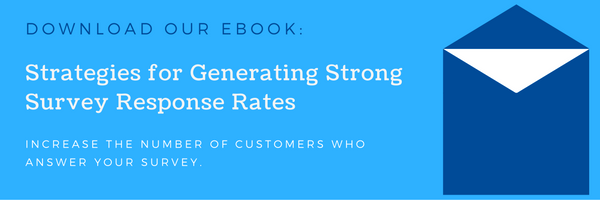Running a customer survey program internally can seem deceptively simple – appoint an internal resource to manage the process, sign up for a free software tool, export your contact list, write the survey questionnaire, administer the survey, and finally…analyze the results.
Is that all it really takes?
Sure, there are countless how-to-guides available to help you execute a customer survey program, but how does one know if they are being truly successful in their efforts?
Specifically, is the feedback collected going to drive the most appropriate actions needed to improve the overall experience for customers and employees, and actually drive profitable growth?
For a quick assessment of your program, answer these four questions:
- Do survey participants trust the survey process, and does the company (and your Board) trust the results?
- Is the company confident that the survey data is reliable and actionable?
- Are customers confident the feedback won’t be wasted – that the company will take action)?
- Is your company able to quantify a clear return on investment (ROI) from your efforts?
Given how important customer loyalty and employee engagement are to your business, there should be some concern if you can’t confidently answer in the affirmative. After all, your customer survey program requires a significant investment of time, so it’s important that it’s successful.
However, if you believe your company can improve in any of the areas above, it might be time to consider bringing in an expert.
Whether you look to hire a full-time employee with extensive expertise in voice of the customer execution, or engage a 3rd party partner, there are a number of compelling benefits:
#1 – You’ll Get Expert Advice on How to Manage Your Voice of Customer Program
Take a look at your most recent customer feedback survey. Did you have a clearly defined process? Was it too long or did it contain too many unrelated questions?
Some of the most common issues we see with in-house survey programs are that questions are worded ambiguously or use inappropriate response scales. Combined, these flaws ultimately yield feedback that is not reliable, relevant, or actionable.
An expert can provide vast experience in execution, statistical analysis, interpretation, and recommendations – which when combined ensure that all stages of the process set the team up for success.
#2 – Customers, Employees, and Key Stakeholders Have Greater Trust in the Program
Proper buy-in and enthusiasm across the organization can’t be established when team members are skeptical of the findings because those preparing the analysis are unable to be impartial or are perceived to have an agenda.
Having a neutral party managing the effort eliminates the possibility of someone making excuses for certain feedback, justifying negative scores, or gaming.
It also allows for a more balanced approach to analyzing the positive and negative themes and the use of proper statistical techniques. The right person or partner will give you the facts and an honest assessment of what it means, without being influenced by internal company factors.
#3 – More Customers Feel Comfortable Providing Honest Feedback
When it comes to your customer satisfaction survey, encouraging participants to share their candid feedback can be a difficult challenge. That’s because programs run by the customer success or service teams often come with the perception that somehow the effort is not objective, or worse yet, the feedback will somehow damage the relationship they have with your company.
Working through an intermediary gives participants confidence their responses will be taken seriously, without repercussions of any kind, thus making them more likely to respond. This is especially true with employee surveys.
And when more people respond, you experience a more reliable and representative data set.
#4 – Your Voice of Customer Program Becomes a Year-Round Focus
Companies often underestimate the time and attention demanded of a properly managed customer survey program. While it’s tempting to view an in-house effort as a cost-saving measure, utilizing internal resources can be a costly and less effective option.
For example, when it comes to overall survey findings, will your internal team have the time and skills needed to create the compelling charts, graphs, and call-outs that are essential to telling a cohesive story and bringing the findings to life for the broader organization?
Turning over your program to a trusted 3rd party enables you to align valuable internal staff to better serve customers, employees, and prospects to grow the business. It also allows you to focus on issues related to strategy, action planning, and culture change.
#5 The Team is Energized to Take Action Based on Real Feedback
All too often, the final and most crucial step of a survey program – effective and efficient follow-up with respondents – can be overlooked.
When this happens, respondents typically disengage from the process rapidly, by either ignoring future survey invitations or actively opting out. And over time, a continual drop in response rates becomes harder to rectify as you’ve essentially trained your customers that you’re not listening to their feedback anyway.
An expert can not only work to relieve a lot of the heavy lifting – leaving you with more time for the crucial direct follow-up that is necessary – but they can also work closely with business leaders to educate employees on how to conduct proper follow-up, socialize the findings to appropriate audiences, and educate all employees on how their actions can influence both the customer experience and the experience of their fellow colleagues.
Lean on Experts for Customer Survey Program Success
In-house survey programs often fall victim to the logistics of the survey design, deployment, interpretation, and reporting. What’s lost, then, is the timeliness of action. Hence, a meaningful return on investment is lost as well.
When you work with an expert, you can avoid some of the most common pitfalls of in-house efforts: Survey fatigue, bias, low response rates, unreliable data, poor follow-up, minimal reporting, and lack of internal support.
When companies shift the burden to an internal or external expert and focus their resources on active listening and rigorous follow-up, they experience a demonstrable ROI from improvements in metrics such as:
- Increased customer loyalty and referrals
- Increased customer retention, reduced churn
- Expansion of existing relationships
- Higher sales close rates
- Increased employee engagement and productivity
- Reduced turnover
Finally, making service excellence part of your company’s DNA is an overall effort that should be owned and driven by company leadership. Without steering and example setting from senior leadership, building a client-centric culture is not something that can be outsourced.
But as you grapple with the challenge of which tactics you will employ to drive this strategy, and which may require outside expertise, consider that your needs may not be as simple as you think.
An expert can ensure that your company doesn’t waste valuable time and resources on data gathering and analysis that may ultimately prove meaningless.


